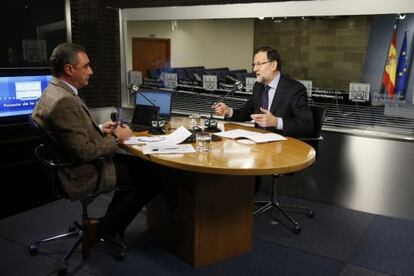Spanish PM: not all election hopefuls targeted by courts should be banned
Rajoy says fate of candidates investigated for corruption should be decided case by case

Prime Minister Mariano Rajoy has admitted that corruption is the issue that has most hurt his Popular Party (PP) during his second term in office. But in an interview with radio station Onda Cero, the Spanish leader also defended that the decision to exclude politicians targeted in criminal investigations from running in elections should be made on a case-by-case basis.
His words echoed recent statements by former Socialist prime minister Felipe González, who told EL PAÍS that it was “a mistake to exclude all investigation targets from the electoral lists.”
Not long ago the Supreme Court shelved accusations against relevant political leaders” Prime Minister Rajoy
“It depends,” said Rajoy, adding that being classed as an imputado – the Spanish term for someone who has been named as a formal suspect in a court case – does not necessarily lead to a conviction.
“In fact, not long ago the Supreme Court shelved accusations against relevant political leaders,” he said.
To Rajoy, the problem with preventing election hopefuls under court investigation from running in elections is that “you are putting them on trial ahead of time. Every case is different, in each specific case it is necessary to make a concrete decision.”
With the PP embroiled in several high-profile corruption investigations, including Gürtel and Púnica, Rajoy noted that the individuals involved in these cases were no longer with the party, and that he was ready to adopt any kind of decision aimed at being “more efficient against corruption, which must not happen again in Spain.”
With regional, local and national elections around the corner, both the PP and the Socialists are trying to shake off the image of corrupt, self-serving behemoths that up-and-coming new parties such as Podemos and Ciudadanos are attributing to them with great success.
Felipe González: not all targets should be excluded from lists
Felipe González, Spain’s longest-serving prime minister (1982-1996) and a key figure in the country’s transition from dictatorship to democracy, recently told EL PAÍS that while he understands the rush by his own Socialist Party and its traditional opponent, the PP, to show Spaniards they are getting tough on corruption, he disagrees with automatically kicking out election contenders who become the targets of a criminal investigation.
Asked when he thought a politician should give up their position because of their involvement in legal proceedings, González said that only if and when a conviction is handed down.
“If we were to apply the Constitution in the strictest sense, then I’d have to say that the right time is at the time of conviction, because it is the justice system that decides if the person should be barred or not,” he said. “But I think it doesn’t only depend on the justice system. Political forces are aware of when they have to replace a leader because he or she is no longer trustworthy.”
Tu suscripción se está usando en otro dispositivo
¿Quieres añadir otro usuario a tu suscripción?
Si continúas leyendo en este dispositivo, no se podrá leer en el otro.
FlechaTu suscripción se está usando en otro dispositivo y solo puedes acceder a EL PAÍS desde un dispositivo a la vez.
Si quieres compartir tu cuenta, cambia tu suscripción a la modalidad Premium, así podrás añadir otro usuario. Cada uno accederá con su propia cuenta de email, lo que os permitirá personalizar vuestra experiencia en EL PAÍS.
¿Tienes una suscripción de empresa? Accede aquí para contratar más cuentas.
En el caso de no saber quién está usando tu cuenta, te recomendamos cambiar tu contraseña aquí.
Si decides continuar compartiendo tu cuenta, este mensaje se mostrará en tu dispositivo y en el de la otra persona que está usando tu cuenta de forma indefinida, afectando a tu experiencia de lectura. Puedes consultar aquí los términos y condiciones de la suscripción digital.








































